Samsung SSD 850 Pro (128GB, 256GB & 1TB) Review: Enter the 3D Era
by Kristian Vättö on July 1, 2014 10:00 AM ESTRandom Read/Write Speed
The four corners of SSD performance are as follows: random read, random write, sequential read and sequential write speed. Random accesses are generally small in size, while sequential accesses tend to be larger and thus we have the four Iometer tests we use in all of our reviews.
Our first test writes 4KB in a completely random pattern over an 8GB space of the drive to simulate the sort of random access that you'd see on an OS drive (even this is more stressful than a normal desktop user would see). We perform three concurrent IOs and run the test for 3 minutes. The results reported are in average MB/s over the entire time.
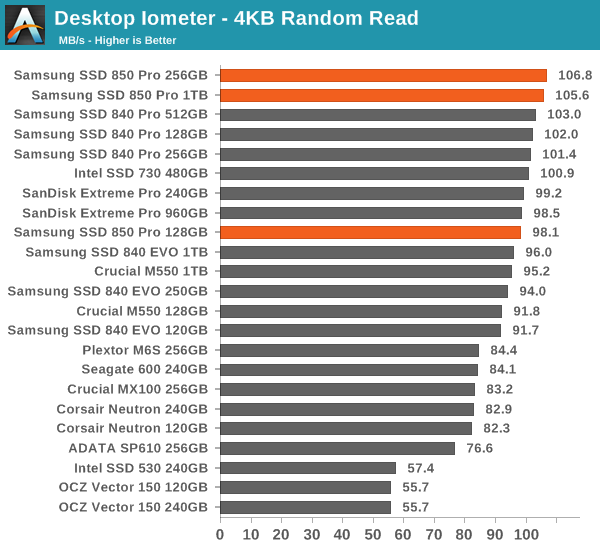
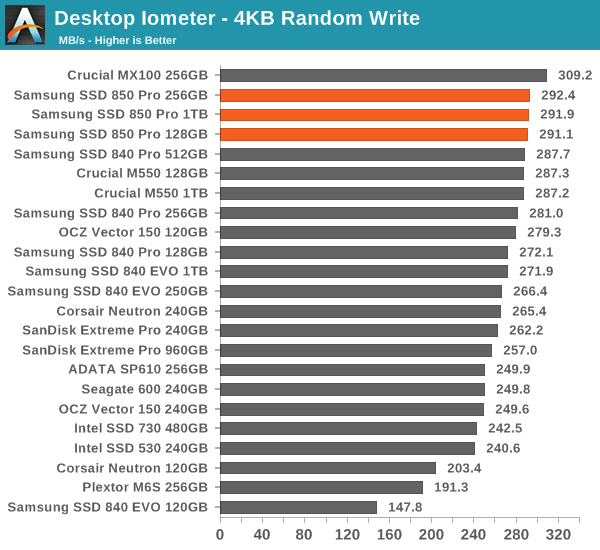
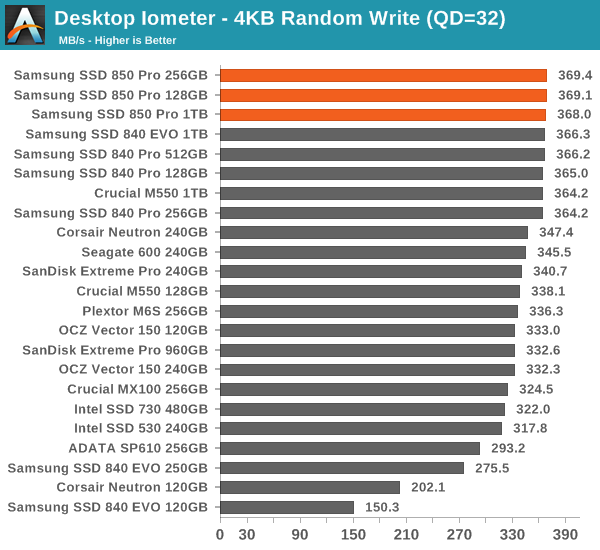
Random performance is also brilliant and the 850 Pro tops almost all of our benchmarks. It is no wonder why it is so fast in the Storage Benches.
Sequential Read/Write Speed
To measure sequential performance we run a 1 minute long 128KB sequential test over the entire span of the drive at a queue depth of 1. The results reported are in average MB/s over the entire test length.
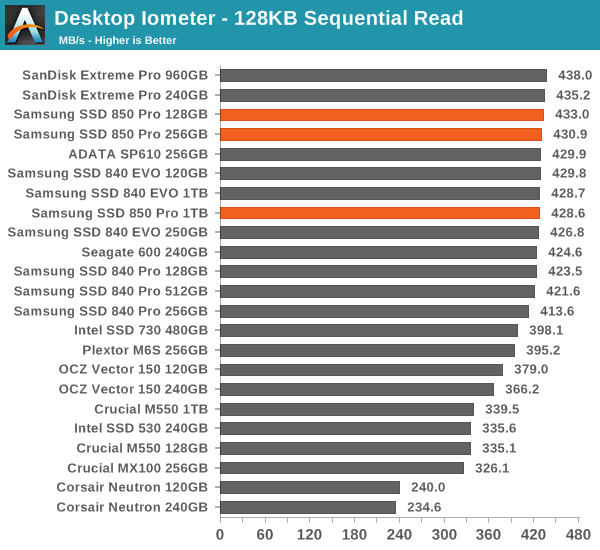
The same goes for sequential speeds. Of course, the differences are not substantial but nevertheless the 850 Pro is fast.
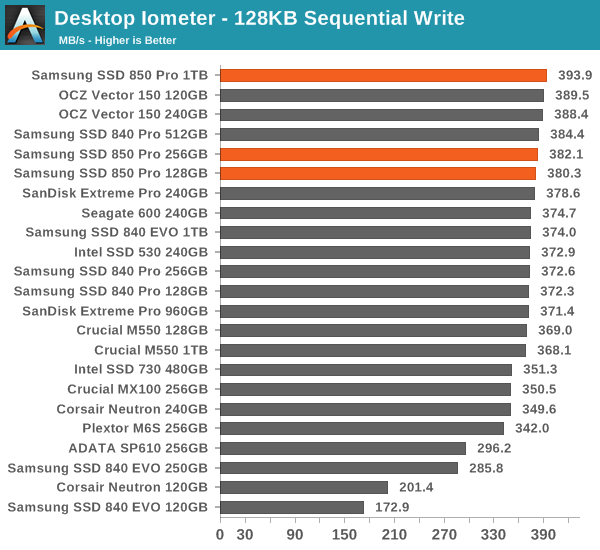
AS-SSD Incompressible Sequential Read/Write Performance
The AS-SSD sequential benchmark uses incompressible data for all of its transfers. The result is a pretty big reduction in sequential write speed on SandForce based controllers, but it doesn't impact most of the other controller much if at all.
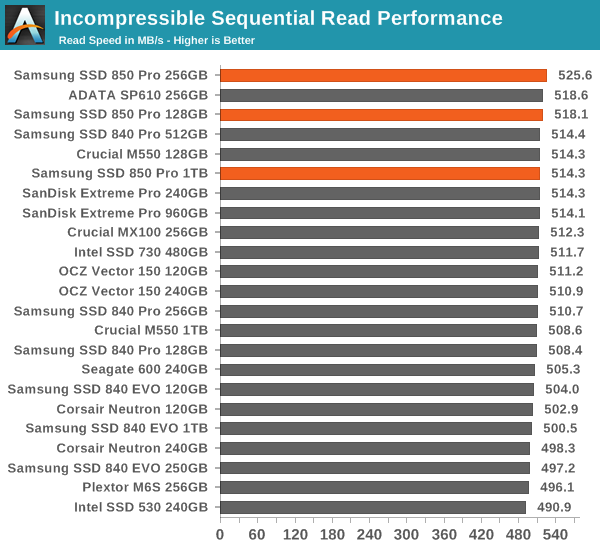
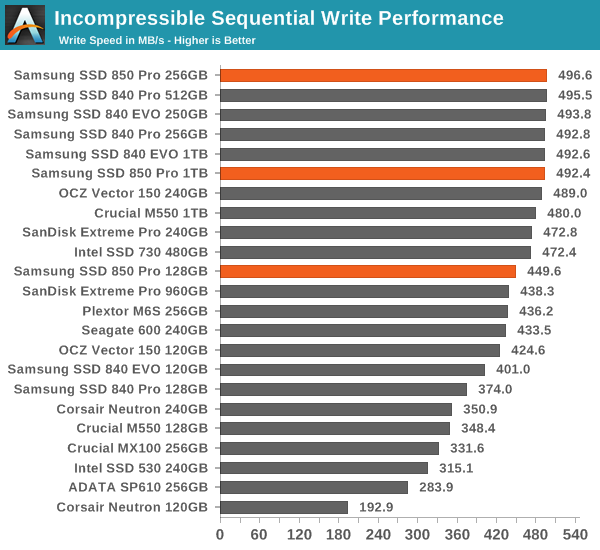










160 Comments
View All Comments
MrSpadge - Tuesday, July 1, 2014 - link
No, it's really "600 MB/s whatever". In reality about 550 MB/s seems to be the maximum. With 300r + 300w full duplex neither read nor write could surpass 300 MB/s.zmeul - Tuesday, July 1, 2014 - link
why I ask thisI see a lot op people putting SSDs in RAID0, and I wonder why ... to me, it seems totally pointless
the system doesn't do only writes or only reads, so what's the point? well, except in the cases where you copy/move some huge files from one matrix to another
Cerb - Tuesday, July 1, 2014 - link
Copying large files, and loading large files. Realistically, you can copy from a new SSD to another at anywhere from 250MBps to 450MBps (including OS/filesystem overhead). That's halved, or worse, copying from an SSD to itself. RAID 0 gives you an approximately linear bandwidth increase. If you don't need a logical or physical separation of data locations, RAID 0 beats a separate drive.When I'm backing up my Bethesda games directory, I wish I had more speed, as it could be done faster in a RAID. However, I only do that one or two times per month (all my saves for all my games are on automatic backup).
For typical light random IO, it very much is pointless.
457R4LDR34DKN07 - Wednesday, July 2, 2014 - link
Easy, say you have 2 sata 2.0 SSD but want sata 3.0 speeds.Kevin G - Tuesday, July 1, 2014 - link
Typo?"I bet many of you would have liked to see the 850 Pro move to the PCIe interface but I understand Samsung's decision to hold on with PCIe for a little while longer."
I think the second PCIe should be SATA.
stickmansam - Tuesday, July 1, 2014 - link
of the "on" could be a "off'Solid State Brain - Tuesday, July 1, 2014 - link
How many P/E cycles does the NAND on this drive support, by SMART data?Kristian Vättö - Tuesday, July 1, 2014 - link
I will test that as soon as I get back from Korea, as well as send you the Extreme Pro data. Sorry for not replying to your email earlier, I kind of lost focus on everything else when I started working on this review :)Solid State Brain - Tuesday, July 1, 2014 - link
No problem, thanks!extide - Tuesday, July 1, 2014 - link
You should actually put up a little pipeline article with all of this data, because it would be interesting to me, and I am sure lots of other users as well.